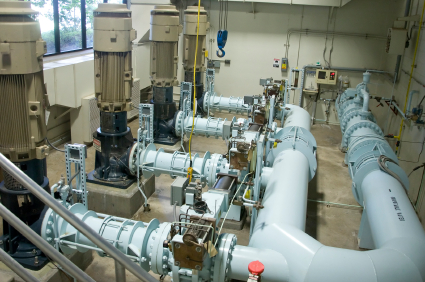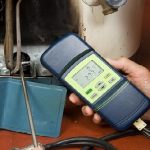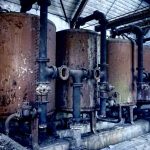Choosing a Commercial Water Heater
It’s probable that water heaters will be needed in all commercial environments, no matter their sector and no matter their size. Unfortunately however, there’s not a one-size-fits-all commercial water heater that we can just take off the shelf, so it’s important that as a facilities manager or procurement officer you’re fully aware of your options, limitations and requirements to choose the ideal system.

Types of Water Heaters
The first thing to know is that there are a couple of different types of water heaters to choose from. Each type of water heater may have any number of models under that particular bracket, but there are two main types to choose from: storage water heaters and tankless water heaters.
1. Storage water heaters
Storage water heaters work using a separate tank to store water that has already been heated up. The main benefit of this system is that there’s always a supply of heated water ready to go. They’re available in various models, including:
Standard
These water heaters benefit from a quick recovery rate between uses, so they’re perfect for usage within environments that require a high level of hot water use. The one weakness of storage water heaters is that their tanks are susceptible to heat loss, so it’s important that you place your heater near to where the water is required in order to minimise this issue. You can insulate your water heater to lessen the heat loss from your tank – using foam cylinders for any pipes and a standard insulation jacket for the tank itself are the most commonly-used methods.
Balanced flue
Flues are used to vent toxic gases away from the appliance and to bring air in for combustion. The type of flue used varies depending on the type of appliance it is being used with. Similar to a standard water heater, but with the added benefit of a flue that draws clean air into the system from outside, these water heaters are ideal for properties where contaminated air is a risk inside the building – a good example would be a building where chemicals are regularly used. They also deliver hot water to the point of use very quickly.
Fan assisted flue
If your property requires immediate access to hot water, but it’s infeasible to have a water heater situated near to the point of use, then fan assisted flues are ideal. Hot water storage tanks can range from 16 ft to 720 ft in length, so make sure you’re aware of the space you have available before opting for one. Hot water can be transferred along the flue quickly, so there’s no need to worry about heat loss in transit.
Storage water heaters are somewhat bulky, though, and this often restricts where you can place them.
2. Tankless water heaters
Instead of storing hot water in a tank ready for use like above, here water is heated on demand. This means that tankless water heaters offer increased efficiency in terms of their water usage, as well as accuracy regarding how much hot water is produced – you only heat up as much as you need, rather than the whole tank. There’s only one type of tankless heater on the market, unlike storage heaters, but there’s still a number of factors to consider before you make your purchase.
Efficiency
As we mentioned above, tankless heaters heat water on demand, rather than keeping a supply of hot water ready. This means you only heat up and use what you need, and there’s no risk of heat loss. Heating the water does require more energy use, though, so it’s important to note that tankless heaters lose out to storage heaters in that regard.
Space
Tankless water heaters are much smaller than storage heaters, which makes them more appealing for installation in certain types of buildings, like historical structures. They can be hung on walls, which is particularly useful if floor space is at a premium.
Heating
Electricity – Electric heaters are often slightly cheaper than other heaters, but their efficiency is inferior to that of gas or propane heaters. One benefit of electric heaters is that they don’t require ventilation. If your environment doesn’t have the highest hot water demand, consider an electrical heater.
Gas – Using a burner at the bottom of the tank, gas water heaters require venting to release the carbon dioxide and water vapour they create. Gas as a fuel is cheaper than electricity, and they are more energy efficient, although the initial cost of the heater is higher.
Propane – Not altogether too different from gas heaters, but only really used where access to the mains gas supply is limited. Propane systems require a large tank on the property to supply the fuel.
Oil – Another fuel type that is only used when there’s no access to the mains gas, oil water heaters require a large tank, too, as they supply the oil to the heater by mixing it with water, turning it into a mist, and then lighting it with a spark.
Heat pump – These types of heater operate by pulling heat from the air and using it to heat the water. Their efficiency is much higher than electric heaters, and they are enjoying an increase in popularity. However, they are still behind storage and tankless heaters in the popularity stakes, and as such, not many manufacturers produce them. Additionally, the upfront costs are quite high.
Lifespan
In terms of longevity, tankless water heaters are the better option. They have an average lifespan of around 20 years, whereas storage heaters last for around 10.
As you can see, there are a number of things to consider when choosing a water heater for your commercial property. All businesses seek to save money where possible, whether that’s on installation or in the recurring bills, but the reality is there is often a compromise between the two.
Whichever you choose, Express Gas Solutions provide high quality installations, repairs and maintenance of commercial water heaters in and around the London area. Our certified engineers are on hand so get in touch with us today to find out more.













